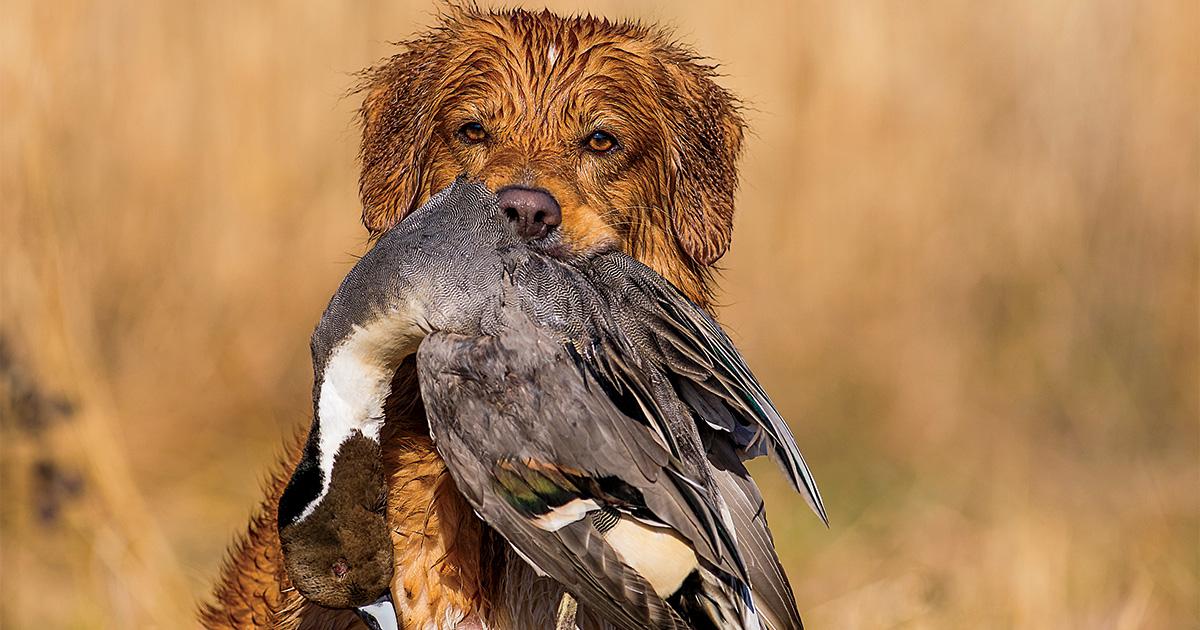
The Backstory of the Nova Scotia Duck Tolling Retriever
A Look at How This Breed Came to Be
The Nova Scotia Duck Tolling Retriever or “Toller” is a breed that really wins the hearts of dog lovers. This amazing breed comes from the lovely area of Nova Scotia in Canada. Developed back in the 19th century, this dog was mainly bred to help hunters attract waterfowl. Its roots trace back to the clever Micmac Tribe, who made a dog that was great at hunting by mimicking fox moves to lure ducks.
The Toller goes by a few other names too like:
- Duck Toller
- Little River Duck Dog
- Yarmouth Toller
These names show where they came from and highlight their fun and lively personality. The breed started getting attention in Canada around 1945 and officially joined the American Kennel Club (AKC) family in 2001.
How They Helped as Duck Tolling Dogs
The main job of the Nova Scotia Duck Tolling Retriever was to “toll” or lure ducks within shooting range. This clever method meant the Toller would splash around by the water, drawing ducks in. Once the birds got close enough, the hunter would scare them up while the dog grabbed the downed birds.
This fun role showcases the Toller’s natural smarts and playful attitude, making them a great buddy for active families today. With their energetic behavior and hunting skills, Tollers have become favorites among waterfowl hunting fans and families who love the outdoors.
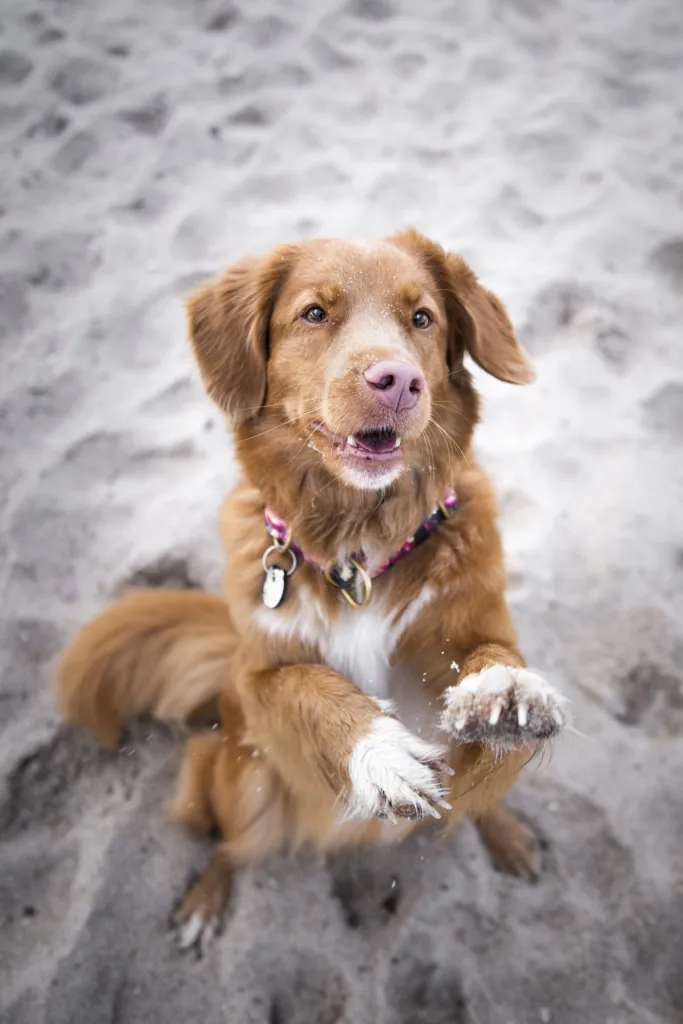
Features and Looks
The Nova Scotia Duck Tolling Retriever’s Unique Traits
The Nova Scotia Duck Tolling Retriever is known for its cool mix of beauty, agility, and practicality. With a medium-size and solid body, these dogs have a muscular build that fits their active lifestyle perfectly. Here are some characteristics that make them special:
- Coat: The Duck Toller has a gorgeous double coat that comes in a rich red shade ranging from golden to copper tones. This water-resistant fur has a thick undercoat and a medium-length outer coat, with some feathering on its legs and tail.
- Facial Features: They have wedge-shaped heads that are similar to a fox, with bright eyes that show their friendliness and curiosity.
- Size: Adult Tollers usually stand about 18 to 20 inches tall, with males weighing around 44 to 51 pounds and females a bit lighter at 37 to 44 pounds.
These unique features help the Toller effectively do its job in hunting, keeping them nimble and agile while luring and retrieving game.
What the Breed Standard Says
The American Kennel Club (AKC) has created a breed standard outlining the key traits of the Nova Scotia Duck Tolling Retriever. Here are the main points:
- Balanced Body: The Toller should have a well-balanced body that supports agility and athleticism.
- Temperament: They are smart, energetic, and eager to please, making them great hunting companions as well as loving pets.
- Sociable Behavior: Tollers love being around people and should receive proper training and socialization early on to adapt well to family life.
Knowing these characteristics helps future owners see the Nova Scotia Duck Tolling Retriever for more than just how they look but also the bubbly personality they add to any home. Their friendly and playful nature makes them a fun addition to any family.
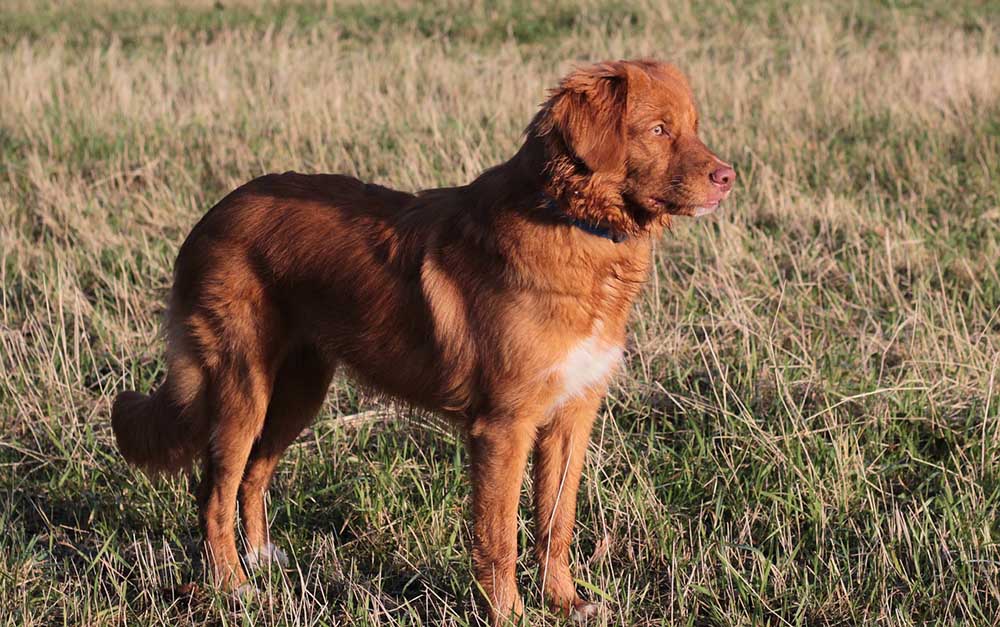
Training and Sociability
Why Early Training Matters for Duck Tollers
Starting to train your Nova Scotia Duck Tolling Retriever (Toller) when they are young is key to harnessing their smarts and playful nature. This breed is known for being eager to please but can also show some stubbornness if not guided well. Early training leads to:
- Good Manners: Teaching basic commands like “sit,” “stay,” and “come” sets the stage for a well-mannered pup.
- Building a Bond: Training time helps strengthen the connection between you and your Toller, making both of you feel close.
- Mental Stimulation: Tollers thrive on thinking challenges, and training gives them a chance to exercise their brain.
Without proper guidance from early on, these pups might pick up bad habits like barking too much or being overly hyper.
Socialization Tips for a Well-Adjusted Dog
Socializing your Toller is just as important to help them grow into friendly and confident adult dogs. A well-socialized Toller is likelier to feel comfy in new places and around different people and pets. Here are some handy tips for socializing your Toller:
- Bring Them to New Locations: Take your Toller to parks, cafes, or busy streets to get them used to various sights and sounds.
- Meet Other Dogs: Set up playdates with other pups to ensure your Toller learns to play nicely in a safe environment.
- Diverse Experiences: Introduce your Toller to people of all ages, from kids to seniors, to help them get comfortable with different kinds of interactions.
By incorporating early training and socialization techniques, you can really make a difference in your Duck Tolling Retriever’s life, helping them grow into well-mannered and happy companions.

Health and Grooming Needs
Common Health Problems in Nova Scotia Duck Tolling Retrievers
The Nova Scotia Duck Tolling Retriever is usually a healthy breed but like many purebreds, they can have some health issues. Knowing about these common problems can help you take steps to prevent them. Here are a few that Tollers might face:
- Hip Dysplasia: This is a genetic condition where the hip joint doesn’t fit right, leading to pain and possible movement issues. Signs to watch for include trouble getting up or climbing stairs.
- Progressive Retinal Atrophy (PRA): This eye condition can eventually cause blindness, starting with issues during night time. While it doesn’t hurt, it does affect the dog’s sight over time.
- Congenital Deafness: Some Tollers can be born unable to hear, a condition that can be managed but needs special attention during training.
Regular vet visits and screenings from responsible breeders can really help cut down the risk of these issues.
Grooming Tips for the Double Coat
Taking care of a Nova Scotia Duck Tolling Retriever’s grooming is important to keep their beautiful coat in shape and ensure overall health:
- Brushing: Brush your Toller every few days to avoid tangles and control shedding. During shedding seasons in spring and fall, daily brushing is best to keep their coat looking good.
- Bathing: A bath should typically happen once a month but feel free to wash them whenever they have a muddy romp to avoid skin irritation.
- Care for Their Feet: Pay attention to the fur around their webbed feet, as it can mat easily. Regular trimming will keep things clean and help with traction on slippery surfaces.
By keeping a steady grooming routine, you’ll help your Toller stay healthy, comfortable, and looking great. Plus, regular grooming is a wonderful way to strengthen your bond with your furry friend, building trust and affection.
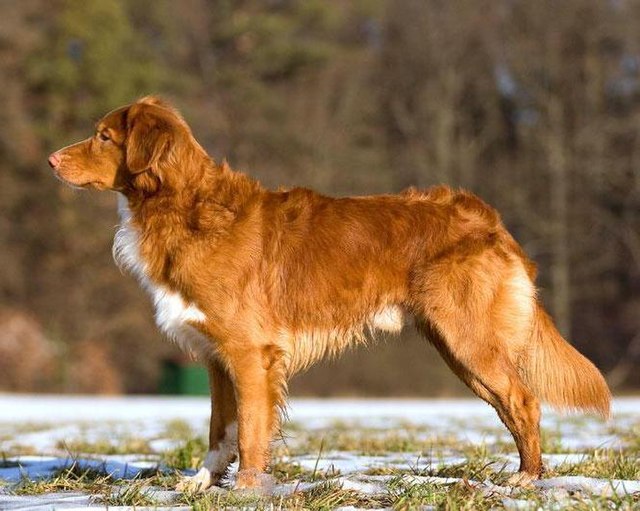
The Nova Scotia Duck Tolling Retriever as a Family Dog
How They Get Along with Kids and Other Pets
The Nova Scotia Duck Tolling Retriever is a fantastic family pet thanks to their loving and friendly personality. These playful pups love lively households and often create strong bonds with their families, especially kids. Here’s why they fit in so well:
- Great with Kids: Tollers typically have a playful and energetic nature, making them perfect playmates with older children. They get a kick out of playing fetch or running around outside.
- Friendly Temperament: With a generally gentle personality, they are less likely to be aggressive and more likely to be affectionate with the family.
- Good with Other Pets: While Tollers usually are friendly with other dogs, their strong hunting instincts may make them not the best buddies for smaller pets like cats or rodents.
These traits help them earn a reputation as a kid-friendly dog breed.
Tips for Welcoming a Toller to Your Family
Adding a Toller to your family can be a fantastic experience. Here are some tips to help make the transition smooth:
- Set Up Routines: Keep a regular schedule for feeding, walk times, and play sessions to help your Toller adjust to the new home.
- Promote Interaction: Supervise playtime with the kids, making sure everything stays positive.
- Socialize Early: Introduce your Toller to different situations, people, and pets early on to help them develop a friendly nature.
- Train Together: Involve family members in training sessions to reinforce good behavior while strengthening your bond.
With the right care and socialization, your Nova Scotia Duck Tolling Retriever will fit right into your family and become a beloved companion for many years.
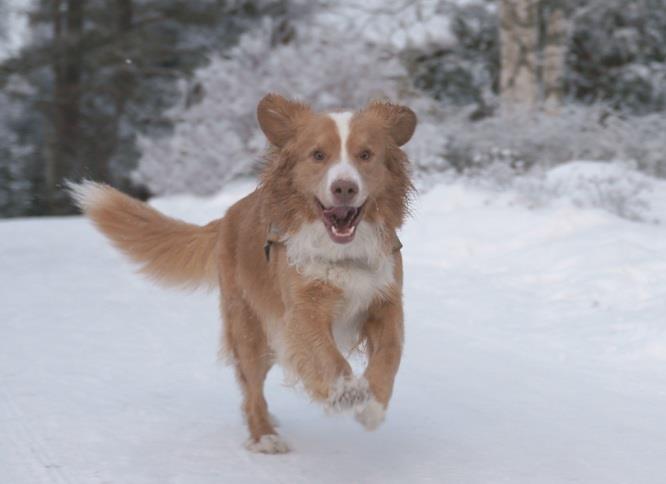
Activities and Sports for Duck Tollers
Fun Activities to Keep Your Toller Happy
The Nova Scotia Duck Tolling Retriever is smart and full of energy, so they need activities that challenge both their minds and bodies. Keeping your Toller entertained is key to making sure they’re happy and well-behaved. Here are some fun ideas:
- Fetch Outdoors: Tollers are born retrievers. Spend time with them throwing a frisbee, ball, or even a stick at the park to tap into their natural hunting instincts.
- Swimming: Most Tollers absolutely love water, so take them to a nearby lake or pool to jump in and splash around.
- Hiking Adventures: These dogs are built for endurance and enjoy outdoor adventures. Pick dog-friendly trails for family hikes.
- Hide and Seek Games: A twist on fetch, you can hide toys or treats around and encourage your Toller to find them, tapping into their natural instincts.
Getting Into Dog Sports Like Retrieving and Agility
If you’re an active family, dog sports will take your Toller’s engagement up a notch. Here are two popular options:
- Retrieving Trials: Let your Toller show off its natural retrieval skills in organized events mimicking real-life hunts.
- Agility Training: This fun sport involves navigating obstacle courses, which is great for challenging your dog mentally and physically while also enhancing your bond.
Doing these fun activities not only helps release their energy but also encourages good behavior, allowing the family to come closer together. With a Nova Scotia Duck Tolling Retriever, there’s always a new adventure waiting!

Leave a Reply